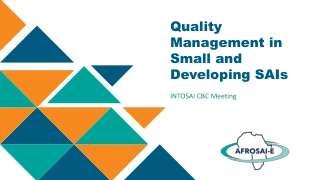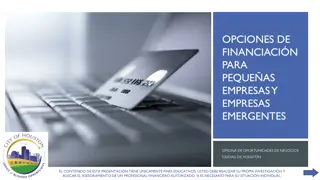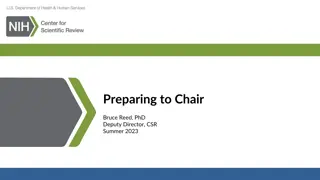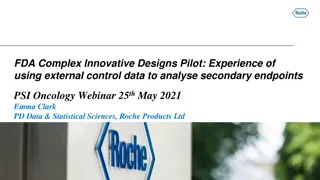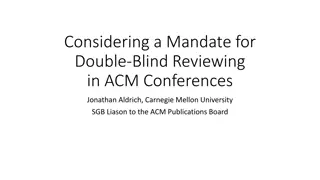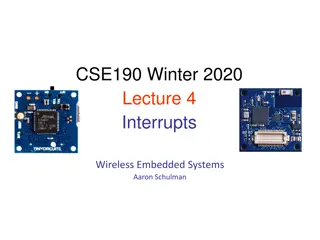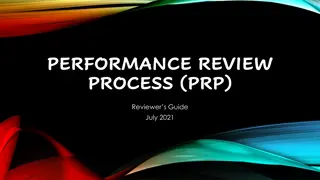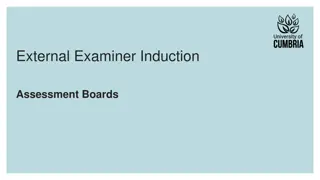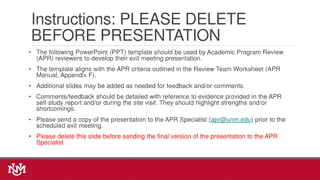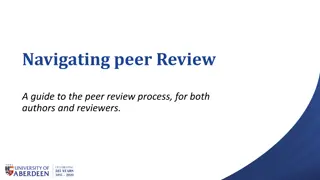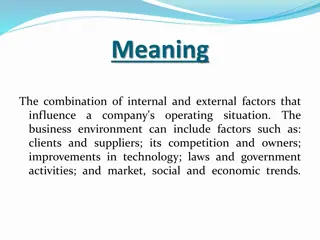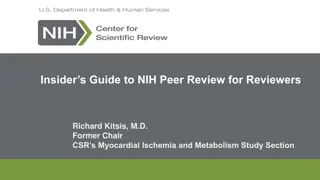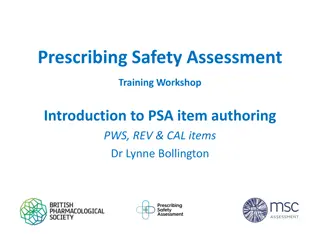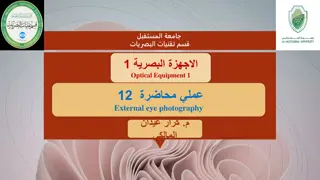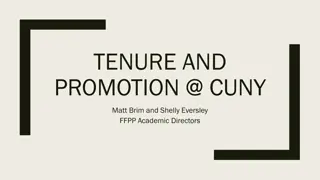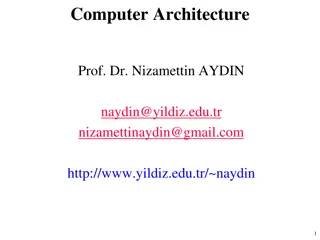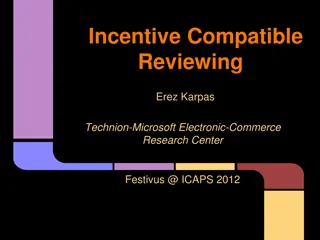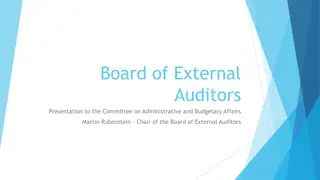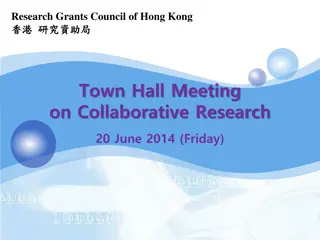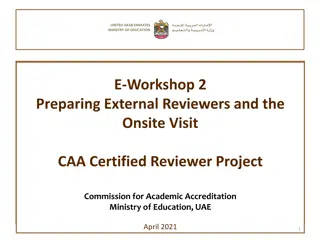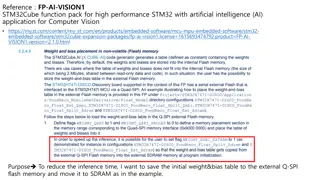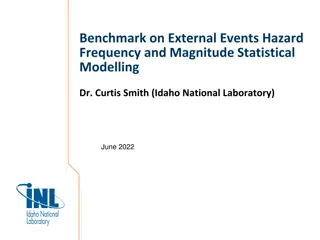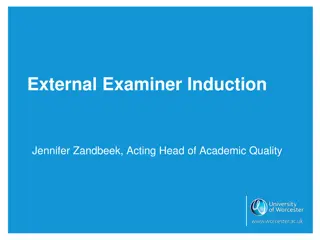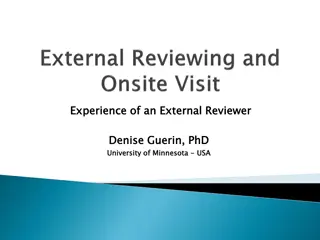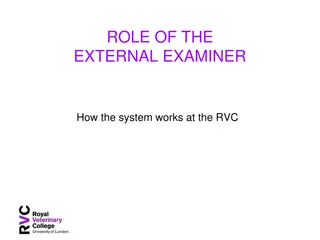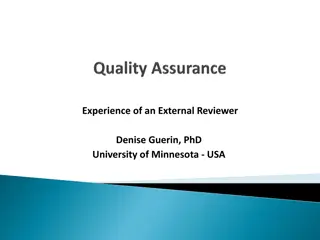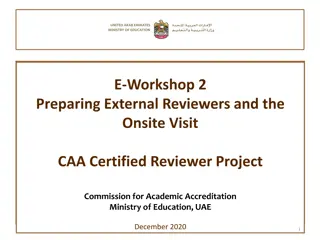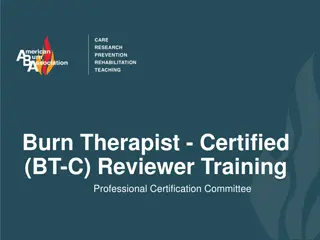Simplified Review Framework
Simplified review framework for peer review criteria in research project grants, aimed at improving the evaluation process for peer reviewers. The framework will address concerns raised by the extramural community regarding increased complexity and administrative burden in NIH's peer review criteria
1 views • 20 slides
Quality Management in Small and Developing SAIs
The challenges faced by small and developing Supreme Audit Institutions (SAIs) in managing quality, including financial constraints, staff turnover, and inadequate governance systems. Discover the successes achieved, such as certified quality assurance reviewers and increased audit coverage.
2 views • 11 slides
Understanding the Role of Managers in Organizational Management and External Environment
Explore the key concepts of organizational management, the role of managers in navigating the external environment, and the impact of external factors on organizational decisions. Learn about micro and macro environments, factors influencing organizations, and strategies for adapting to external cha
3 views • 18 slides
Enhancing Public Financial Management Through External Audits
Strengthen the performance of the Public Financial Management system by utilizing external audits and international standards. Main entry points for SAIs, diagnostic tools, and challenges in assessing PFM are discussed. Learn how to effectively use diagnostic tools to complement audit work and addre
0 views • 8 slides
Understanding External Financing Options for Small Businesses and Startups
Exploring the need for external financing, differences between debt and self-funding, evaluation criteria, and a comprehension test to assess the need for external financial assistance in a concise, educational manner.
3 views • 20 slides
Strategies for Successful Research Funding Proposals
Research active academics play a crucial role in attracting external research funding, benefiting both the university and individuals. This involves building a strong team, networking, and collaboration to enhance publications and impact. Knowing funders' aims, standing out among proposals, and conv
2 views • 17 slides
Ensuring Thermal Model Integrity: Best Practices and Guidelines
Learn how to conduct effective model reviews to validate thermal models, identify errors, and enhance overall reliability. Discover the importance of independent assessments, ideal timing for reviews, key aspects to encompass, suitable reviewers, and timeframes for different model complexities.
7 views • 52 slides
Roles and Responsibilities of Study Section Chair and Meeting Participants
Understanding the distinct roles of study section chairs and meeting participants is crucial for effective research proposal evaluation. The study section chair leads discussions and implements policies, while meeting participants, including the Scientific Review Officer (SRO) and reviewers, play co
5 views • 14 slides
Experience in FDA Complex Innovative Designs Pilot Meeting: Incorporating External Controls in Phase 3 Study for DLBCL
Explore the experience of participating in the FDA's CID Pilot Meeting, focusing on designing a Phase 3 study for DLBCL with an external control arm for secondary overall survival. Discover key considerations for future studies with external controls to address high unmet medical needs in DLBCL pati
0 views • 13 slides
Enhancing Peer Review Quality Through Double-Blind Reviewing in ACM Conferences
Double-blind reviewing (DBR) is increasingly recognized for its effectiveness in reducing biases, improving article quality, and practicality in ACM conferences. Studies show evidence of gender and institutional biases in single-blind reviewing, while DBR enhances fairness and credibility. DBR revie
0 views • 9 slides
Top 12 Tricks for Mainstreaming Gender in Publications
Tricks recommended for mainstreaming gender in publications include considering gender throughout the development process, integrating gender in each section, seeking women's perspectives in research, providing gender-disaggregated data, aiming for gender balance among reviewers, involving a gender
0 views • 5 slides
Understanding the Horse-Cart System: Forces and Acceleration Explained
The Horse-Cart problem delves into the dynamics of forces acting on a horse pulling a cart, highlighting the importance of net forces, accelerations, and external interactions with the ground. The analysis simplifies the complex system by focusing on key forces impacting the cart's movement and the
0 views • 17 slides
Understanding Interrupts in Embedded Systems
In embedded systems, interrupts play a crucial role in letting peripherals notify the CPU of state changes. They are events external to the current process that disrupt the normal flow of instruction execution, typically generated by hardware devices. By using interrupts, CPUs can efficiently handle
1 views • 12 slides
Understanding External CSS and How to Implement It
Learn the different methods of inserting CSS into your HTML documents, including inline styles, internal style sheets, and external style sheets using the tag. Explore the benefits of using external style sheets to easily update the look of your entire website. Follow step-by-step instruction
1 views • 8 slides
Performance Review Process (PRP) Guide for Reviewers - Overview and Tips
This guide aims to assist line managers and reviewers in preparing for performance review meetings. It covers the objectives of the CRGPA performance review process, key stages in the process, discussion areas, top tips for planning, and an overview of the performance review process. Emphasizing on
1 views • 26 slides
Academic Assessment Boards and Examiners Overview
Academic assessment boards such as the University Progression & Award Board and Module Confirmation Board play a crucial role in confirming student outcomes and award decisions. External examiners are involved in evaluating student marks and ensuring adherence to regulations. The Quality Enhancement
0 views • 9 slides
Academic Program Review Exit Meeting Presentation Template
This PowerPoint template is designed for Academic Program Review (APR) reviewers to prepare their exit meeting presentations. It includes sections for overall program strengths, criteria evaluation, and findings on strengths and shortcomings. Reviewers can customize the template by adding additional
0 views • 13 slides
Navigating Peer Review: A Comprehensive Guide for Authors and Reviewers
In academic publishing, peer review plays a crucial role in maintaining publication quality. This guide offers a detailed overview of the peer review process for both authors and reviewers, covering topics such as receiving review invitations, manuscript submission, writing effective reviews, and mo
0 views • 31 slides
Understanding Business Environment: Internal and External Factors
The business environment is shaped by a combination of internal and external factors that impact a company's operations. Internal factors like shareholders, management structure, and human resources are under the company's control, while external factors such as economic, social, technological, and
0 views • 12 slides
Insider's Guide to NIH Peer Review for Reviewers by Richard Kitsis, M.D.
This insider's guide provides valuable insights for reviewers participating in NIH grant application peer reviews. It covers essential aspects such as staying grounded, getting started, writing reviews effectively, scoring applications, participating in meetings, and enjoying the overall experience.
0 views • 12 slides
Prescribing Safety Assessment - Item Development Process Overview
In the Prescribing Safety Assessment Workshop, item authoring is a crucial process involving multiple stages such as new item creation, editing, peer review, and final assessment board approval. Copy editors and clinical reviewers ensure the accuracy and quality of item content, while peer reviewers
0 views • 32 slides
Advancements in Ophthalmic External Photography
Ophthalmic external photography, particularly external ocular photography (EOP), plays a vital role in ophthalmology practice by capturing images of the eye, ocular adnexa, and facial structures. It aids in documenting lesions, nerve anomalies, surgical outcomes, and disease progression. Digital pho
0 views • 17 slides
Guidelines for Tenure and Promotion Process at CUNY
Comprehensive guidelines for the tenure and promotion process at CUNY, including expectations for scholarly publications, external reviews, dossier components, and strategic planning. Learn about the key stages, involvement of academic directors, external reviewers, and decision-making entities to n
0 views • 15 slides
Understanding External Memory in Computer Architecture
Exploring the world of external memory in computer architecture, this comprehensive guide covers topics such as magnetic disks, external memory types, data organization, disk velocity, and read/write mechanisms. Dive into the intricacies of different storage mediums like solid-state drives, optical
0 views • 60 slides
Phase 2 Comprehensive Rule Update Legislative Rule Package Overview
Seven subdivision bills were adopted during the 2023 session, covering various topics such as independent reviewers, cut and fill systems, connection to public sewer systems, and more. The public comment period and hearing are scheduled, with the draft rule to respond to comments by August 25. A bil
3 views • 17 slides
Strategies for Effective Paper Reviewing in Academic Circles
In the world of paper reviewing, the importance of incentivizing good reviews is explored through game theory models. The goal is to ensure quality papers are accepted and bad ones are rejected. Strategies like rewarding good reviewers and proposing innovative incentives like free beers are discusse
0 views • 8 slides
Board of External Auditors Presentation Highlights
The presentation by Martin Rubenstein, the Chair of the Board of External Auditors, outlines the responsibilities, membership, and mandate of the board in conducting external audits of the financial accounts of the OAS. Key findings and recommendations regarding accounting practices, liquidity issue
0 views • 6 slides
Research Grants Council of Hong Kong Collaborative Research Procedures
Research Grants Council of Hong Kong facilitates collaborative research through a structured process involving preliminary proposals, full proposals, cross-disciplinary projects, and strategic considerations for funding decisions. The council evaluates proposals through multiple stages, involving re
1 views • 8 slides
Insights into Editorial Responsibilities and Avoiding Desk Rejection in Academic Publishing
Editors play a crucial role in setting the tone of academic discourse, enforcing ethical standards, and advancing technical standards in publishing. Avoiding desk rejection in academic publishing can significantly impact the acceptance of a paper, with an emphasis on the importance of writing qualit
0 views • 32 slides
Enhancing Academic Accreditation Process: Onsite Visit and Self-Study Analysis
The e-workshop sessions focus on preparing external reviewers, analyzing self-study documents, and understanding the purpose of onsite visits in academic accreditation. Topics covered include self-study definition, evaluating weaknesses identified by reviewers, and the importance of the onsite visit
0 views • 16 slides
Optimizing Inference Time by Utilizing External Memory on STM32Cube for AI Applications
The user is exploring ways to reduce inference time by storing initial weight and bias tables in external Q-SPI flash memory and transferring them to SDRAM for AI applications on STM32Cube. They have questions regarding the performance differences between internal flash memory and external memory, r
0 views • 4 slides
Statistical Modelling of Hazard Frequency and Magnitude in External Events
Dr. Curtis Smith from Idaho National Laboratory presented a benchmark on External Events Hazard Frequency and Magnitude Statistical Modelling. The background involves the Working Group on External Hazards (WGEV) addressing the challenges in formulating and assessing external event initiating events
0 views • 11 slides
Understanding Arduino Timer and External Interrupts
Interrupts play a crucial role in Arduino programming, allowing for immediate responses to external events. This content covers the concepts of timer interrupts and external interrupts, their applications, and how to use them effectively in Arduino projects. It explains how interrupts work, provides
0 views • 11 slides
Overview of External Wireless Communication System on International Space Station (ISS)
This presentation covers the overview and experience of implementing an external 802.11n wireless communication system on the International Space Station (ISS). It discusses the existing wireless system, committed users, system architecture, and future challenges. The system provides high data rate
0 views • 18 slides
Understanding the Role of External Examiners in Academic Quality Assurance
External examiners play a crucial role in maintaining the quality and standards of academic assessments. They ensure independence, objectivity, and fairness, while identifying good practices and opportunities for enhancing student experiences. From appointment to handover, external examiners contrib
0 views • 12 slides
Expertise in External Reviewer Practices for Higher Education Evaluation
Gain insights from Denise Guerin, PhD, on serving as an external reviewer and contributing to improving institutions, programs, faculty, and students through consultancy. Follow a structured approach, starting from reading the guide for external review teams, familiarizing with CAA standards, to par
0 views • 5 slides
Role of External Examiners at RVC
External examiners at RVC play a crucial role in verifying academic standards, ensuring fair assessment processes, and maintaining quality across higher education awards. Their duties include approving examination papers, scrutinizing marking standards, and attending Board of Examiners meetings. The
0 views • 22 slides
Expert Reviewer Guidelines for Higher Education Quality Assessment
Tips and steps for external reviewers in higher education to conduct quality assessments effectively, including reviewing institutional documents, asking questions, and confirming data in the self-study report.
0 views • 7 slides
E-Workshop on Preparing External Reviewers and Onsite Visit for Academic Accreditation
This e-workshop held by the Ministry of Education in the UAE focused on preparing external reviewers and institutions for onsite visits related to academic accreditation. It covered the importance of analyzing the self-study, identified common weaknesses in self-studies, and highlighted the purpose
0 views • 16 slides
Burn Therapist Certified (BT-C) Reviewer Training Program
The Burn Therapist Certified (BT-C) Reviewer Training Program aims to promote and recognize occupational and physical therapists specializing in burn rehabilitation. Reviewers are selected based on specific criteria and are required to undergo training and complete mock reviews before evaluating por
0 views • 35 slides

